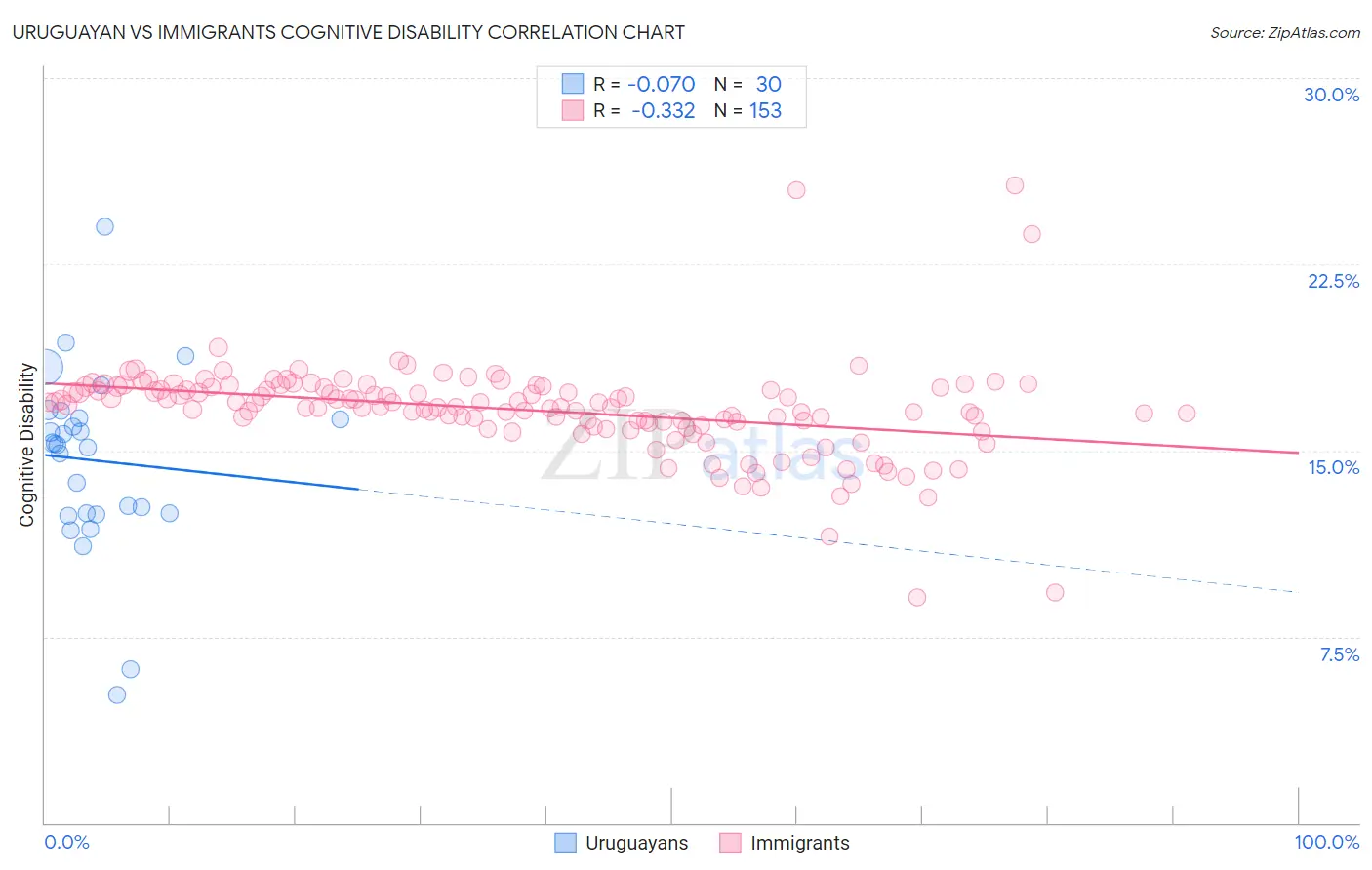Uruguayan vs Immigrants Cognitive Disability
COMPARE
Uruguayan
Immigrants
Cognitive Disability
Cognitive Disability Comparison
Uruguayans
Immigrants
16.8%
COGNITIVE DISABILITY
97.2/ 100
METRIC RATING
111th/ 347
METRIC RANK
17.2%
COGNITIVE DISABILITY
62.5/ 100
METRIC RATING
168th/ 347
METRIC RANK
Uruguayan vs Immigrants Cognitive Disability Correlation Chart
The statistical analysis conducted on geographies consisting of 144,784,951 people shows a slight negative correlation between the proportion of Uruguayans and percentage of population with cognitive disability in the United States with a correlation coefficient (R) of -0.070 and weighted average of 16.8%. Similarly, the statistical analysis conducted on geographies consisting of 577,580,100 people shows a mild negative correlation between the proportion of Immigrants and percentage of population with cognitive disability in the United States with a correlation coefficient (R) of -0.332 and weighted average of 17.2%, a difference of 2.2%.

Cognitive Disability Correlation Summary
| Measurement | Uruguayan | Immigrants |
| Minimum | 5.2% | 9.1% |
| Maximum | 24.0% | 25.7% |
| Range | 18.9% | 16.6% |
| Mean | 14.6% | 16.6% |
| Median | 15.2% | 16.8% |
| Interquartile 25% (IQ1) | 12.5% | 16.0% |
| Interquartile 75% (IQ3) | 16.3% | 17.6% |
| Interquartile Range (IQR) | 3.8% | 1.5% |
| Standard Deviation (Sample) | 3.7% | 1.9% |
| Standard Deviation (Population) | 3.6% | 1.9% |
Similar Demographics by Cognitive Disability
Demographics Similar to Uruguayans by Cognitive Disability
In terms of cognitive disability, the demographic groups most similar to Uruguayans are Arapaho (16.8%, a difference of 0.010%), Albanian (16.8%, a difference of 0.020%), Indian (Asian) (16.8%, a difference of 0.020%), Immigrants from Sri Lanka (16.8%, a difference of 0.030%), and Korean (16.8%, a difference of 0.030%).
| Demographics | Rating | Rank | Cognitive Disability |
| Palestinians | 98.0 /100 | #104 | Exceptional 16.8% |
| Immigrants | Eastern Asia | 97.9 /100 | #105 | Exceptional 16.8% |
| Northern Europeans | 97.8 /100 | #106 | Exceptional 16.8% |
| Immigrants | Nicaragua | 97.8 /100 | #107 | Exceptional 16.8% |
| Canadians | 97.5 /100 | #108 | Exceptional 16.8% |
| Albanians | 97.3 /100 | #109 | Exceptional 16.8% |
| Arapaho | 97.3 /100 | #110 | Exceptional 16.8% |
| Uruguayans | 97.2 /100 | #111 | Exceptional 16.8% |
| Indians (Asian) | 97.2 /100 | #112 | Exceptional 16.8% |
| Immigrants | Sri Lanka | 97.1 /100 | #113 | Exceptional 16.8% |
| Koreans | 97.1 /100 | #114 | Exceptional 16.8% |
| Yup'ik | 96.9 /100 | #115 | Exceptional 16.9% |
| Inupiat | 96.5 /100 | #116 | Exceptional 16.9% |
| Immigrants | Japan | 96.2 /100 | #117 | Exceptional 16.9% |
| Immigrants | Denmark | 96.2 /100 | #118 | Exceptional 16.9% |
Demographics Similar to Immigrants by Cognitive Disability
In terms of cognitive disability, the demographic groups most similar to Immigrants are Immigrants from Portugal (17.2%, a difference of 0.020%), Immigrants from Syria (17.2%, a difference of 0.030%), Immigrants from Ecuador (17.2%, a difference of 0.060%), Immigrants from Albania (17.2%, a difference of 0.070%), and Ecuadorian (17.2%, a difference of 0.090%).
| Demographics | Rating | Rank | Cognitive Disability |
| Americans | 72.2 /100 | #161 | Good 17.2% |
| Yugoslavians | 71.6 /100 | #162 | Good 17.2% |
| Immigrants | Switzerland | 71.5 /100 | #163 | Good 17.2% |
| Armenians | 70.1 /100 | #164 | Good 17.2% |
| Immigrants | Albania | 64.9 /100 | #165 | Good 17.2% |
| Immigrants | Ecuador | 64.4 /100 | #166 | Good 17.2% |
| Immigrants | Syria | 63.5 /100 | #167 | Good 17.2% |
| Immigrants | Immigrants | 62.5 /100 | #168 | Good 17.2% |
| Immigrants | Portugal | 61.8 /100 | #169 | Good 17.2% |
| Ecuadorians | 59.6 /100 | #170 | Average 17.2% |
| Tlingit-Haida | 59.4 /100 | #171 | Average 17.2% |
| Immigrants | Turkey | 56.7 /100 | #172 | Average 17.2% |
| Immigrants | Northern Africa | 50.2 /100 | #173 | Average 17.3% |
| Laotians | 50.0 /100 | #174 | Average 17.3% |
| Tsimshian | 49.8 /100 | #175 | Average 17.3% |